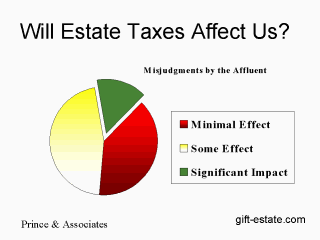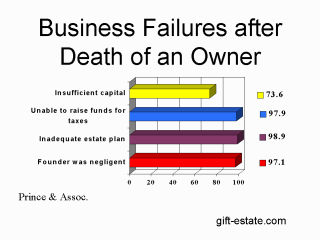Estate planning malpractice issues – Vaughn W. Henry & Associates
Once again estate tax relief is being discussed in Congress, one of the unforeseen consequences is that for many people, already reluctant to solve estate planning problems, this gives them just another excuse to procrastinate. While 95 % of families aren’t faced with a federal estate tax problem, there are still many reasons to design a business succession strategy or complete an estate plan to preserve the security, control and value of their estate. For any family that pays unwanted estate taxes, either their advisors were unskilled or the parents were negligently oblivious to the information provided by numerous print articles, books, news reports, seminars and advice from their professional counselors. What brings this comment to the forefront? Lately I’ve been receiving inquiries from litigation firms seeking referrals to heirs of families that have paid estate taxes and lost businesses or farms. The obvious conclusion is there are disgruntled heirs out there who feel that their cut of the estate was diminished in some way because dad’s advisors somehow “fumbled the ball”. After the dust from the great tobacco lawsuit war settles, the next target may be providers of estate planning solutions that didn’t work as the heirs expected. Who’s on the hook? Attorneys, trust officers, accountants, financial and gift planners and life insurance agents all provide estate-planning advice; a lot has backfired. I expect some are now concerned about heirs looking to correct errors of omission and commission when the tax bill comes due.
- Clients create tax neutral living trusts believing they’ve solved tax problems and/or never bother to re-title their assets and properly fund the trust.
- Clients maintain joint ownership of significant assets when provisions should be made to preserve the clients’ exemptions (the applicable exclusion is $675,000 per person this year- 2000) or the will passes significant property back to the surviving spouse after ownership was previously split for tax purposes.
- Advisors fail to use ways to make gifts to heirs of assets by using tax-free annual exclusions.
- Advisors fail to test their client’s tolerance for charity.
- Advisors don’t “freeze, squeeze, stuff and spread” assets.
- Failure to make use of special tax elections like special use valuations or alternate valuation dates.
- Improper beneficiary designations for retirement plans and insurance have come back to haunt blended families when benefits are incorrectly paid to ex-spouses or unforeseen heirs.
- Owning insurance that improperly winds up being counted in the taxable estate can expose heirs to unnecessary tax. Incorrect use of irrevocable life insurance trusts.
- The estate plan didn’t provide for adequate liquidity and didn’t preserve or stabilize the value of the family business.


The amazing thing about estate taxes is that so few semi-affluent families take a proactive role to effectively and legally avoid them. Too many wealthy families don’t know that estate taxes are voluntary and, with a suitable plan, may be eliminated. In a study of affluent business owners, the financial survey firm of Russ Prince & Associates, found that only 15.3% of heirs felt that estate taxes were going to be a significant problem in their own family’s business succession plans. After those businesses failed, a follow up study of the same heirs who mistakenly thought taxes weren’t going to be an issue, 97.1% felt the founders’ own negligence in their estate and business planning contributed to the failure. Now there’s an attitude that can be tweaked enough to shift blame to a target more accessible and financially better off than dad. The damages are easy to assess; after all, the tax bill is an obvious place to start. Since tax planners tend not to want to drag out litigation for fear of disrupting an ongoing business that depends on advisors keeping a low profile, they may be real targets of opportunity for unhappy family heirs.
The percentage of families with investable assets in excess of $1 million continues to rise and clusters of wealth exist in places where advisors still fail to provide appropriate advice. What does this mean for planners and their clients? More consideration should be given to creating teams of specialists who can craft a plan that meets the family’s need for liquidity, tax reduction, control and security. Unfortunately, there are professional advisors who don’t feel a responsibility to save taxes or preserve an estate. It’s not uncommon to hear “the kids inherited more than they deserved” or “it’s not my job to cut a tax bill” or “the client never asked me about taxes, they only wanted a simple will”. Many commentators feel that an advisor has an ethical duty to present a range of options to a client that includes tax reduction and a discussion of family values an estate plan propagates. One might contrast this situation with a patient going to a physician about a head cold, and the examining doctor observes a large irregular and discolored mole. The patient didn’t ask the physician about skin cancer, but the doctor has a duty to pursue the diagnosis and treatment, not wave it off and later claim in a malpractice trial that the deceased patient never asked him to do anything about an obvious problem. There should be no more excuses about clients not asking about whether or not tax saving techniques were available, clients generally don’t have enough background to judge what’s appropriate for their situation. After all, they chose an experienced professional advisor instead of a cookie cutter approach that assumes one size fits all; clients should have a family friendly plan crafted to meet their unique needs for flexibility. Professional tax and legal advisors should make a greater effort to educate their clients and help them understand the problem and provide solutions that meet all of their clients’ concerns.